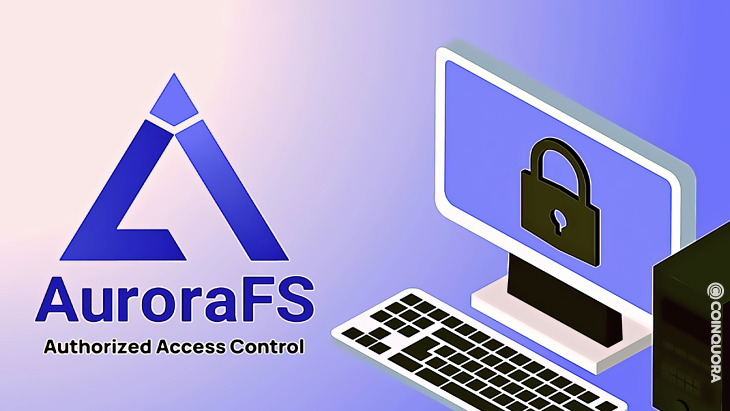- AuroraFS introduces the Authorized Access Control (AAC) to boost security.
- The ACC is new in the decentralized content market.
- The feature can help decentralized content streaming industry to scale with security.
AuroraFS P2P cloud storage and distribution network recently announced the implementation of a feature that has been an anticipated addition to the network since its inception and early development. This feature – Authorized Access Control (AAC) – is an automated process that gives the network an additional layer of security.
The new feature establishes a difference between the AuroraFS commercial-grade decentralized content storage and streaming network from other non-commercial developments and not-fully decentralized networks. This extra layer of security is new in the decentralized content market. Until now, initiatives like the Ethereum Swarm algorithm and the InterPlanetary File System (IPFS) (IPFS) DHT-dependent (Distributed Hash Table) storage protocol have operated without the luxury of heightened network security measures.
What Is Authorized Access Control Exactly?
AAC is a process that makes it necessary for each node that requests data within the AuroraFS decentralized content network to have a unique string of information that acts as a key whenever requesting stored data on the network.
Before this development, other systems were limited to data retrieval schemes that do not possess the extra layer of security that is provided by the newly implemented AuroraFS AAC. Data can include any video, audio, visual, and other types of stored and transmitted data on the AuroraFS decentralized network.Web3Tube, an AuroraFS development, will benefit directly from this extra layer of security on the decentralized video storage and sharing platform.
AAC gives each independent transfer of data within the AuroraFS network its extra security process. A unique process happens when a node requests data for a client to playback a video or access a document, e.g., through any number of decentralized applications which currently are or will be deployed on the AuroraFS peer-to-peer network blockchain in the future. If the node requesting the data doesn’t present the correct authorized information when requesting the unique data, the node is denied access to the requested information. The system records the event and singles out the unauthorized node for total system protection. The nodes, which play a part in denying and reporting the node, get rewarded in the blockchain incentivizing structure through this process.
How Does Authorized Access Control Benefit Businesses and Organizations?
AAC can be one of the pieces which help scale the decentralized content streaming industry with security that is unwaveringly necessary for corporate and larger industry clients to move forward and consider using.
Security has been a concern up until now. The systems which have been built have most often not been able to ensure closed access to the network. That scenario renders all information stored on any blockchain network accessible to every node with network access. This means all stored information is visible to all accessible nodes, not nearly secure enough for industry or major business utilization.
AAC has the potential to change this. It opens the possibility for companies and corporations across industries which require heightened security in the decentralized web space to operate with a level of safety that ensures peace of mind.
What Else Has AuroraFS Been up to?
The Gauss Aurora Labs team of contributors is in Melbourne, Australia, attending the FinTech21 conference, which brings together blockchain and crypto professionals with tech innovators, investors, and professionals within the space. The 18th and 19th of May are centered around presentations and exhibitions planned by the team of contributors to demonstrate the AuroraFS decentralized network to conference attendees.
In addition to their most recent public appearance at FinTech21, AuroraFS is still amid two campaigns in which members of the community are taking part to receive their share of future AUFS token airdrops. Top participants in flow energy, a metric that measures how much content any particular node on the Web3Tube has watched, receive their share of AUFS tokens for finishing in the top 500 viewers with flow energy accumulated.
The second ongoing campaign is a contest in non-staking broadband mining. Miners on the AuroraFS network receive their part in future AUFS token airdrops for providing bandwidth to the global data resource pool, which Web3Tube and future DApps hosted on AuroraFS depend on operation and function. Individuals candownload the latest version of AuroraFS to get involved. Both contests are scheduled to run through May 27th.
Final Words and Next Steps for AuroraFS
The AuroraFS token airdrops are expected to be conducted within weeks of campaigns and contest closing. Web3Tube is also anticipated to be released at its full capacity soon, with updates to the application also expected.
AUFS tokens and the full AuroraFS decentralized blockchain are expected to be released in Q3 when fully ready. Until that time, continued contests, Web3Tube updates, developments like the newly added Authorized Access Control, and other progress can be followed closely through the AuroraFS social media channels and open Telegram community.
Disclaimer:CoinQuora does not, and will officially not endorse any company or individual on this sponsored article. Any information published in this sponsored article does not equal financial advice. We encourage everyone to do their own research before investing in cryptocurrencies.


